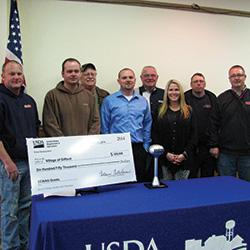
“The legitimate object of government is to do for a community of people whatever they need to have done, but cannot do, at all, or cannot, so well do, for themselves in their separate and individual capacities.”
—President Abraham Lincoln
The work being done in the communities affected by the November 17th tornadoes exemplifies the meaning of this quote. In Washington, Illinois, Rural Development has made available its business programs to help assist those businesses that suffered direct or indirect losses as a result of the storm. Though Washington was not previously eligible for these programs, Illinois Rural Development sought and was granted a waiver to make it eligible. Our community facility program can also assist Washington in financing facilities essential to the community.
In Gifford, Illinois, we are assisting the village with funds to replace the water treatment plant, which was completely destroyed by the tornado, as well as providing funds for the water tower, which will be rebuilt on a site adjacent to the plant. Gifford is the first community in the nation to utilize Rural Development’s simplified emergency grant process, enabling it and its residents to recover more quickly. This rural village of 1,000 is also eligible for our housing, business and community facility program.
When a community is faced with disaster recovery, it is our mission at USDA Rural Development to step in and meet the needs of that community, business or homeowner. Much was the case in Elmwood, Illinois, after a tornado in 2010 severely damaged its downtown area. Rural Development provided Elmwood with a $99,000 Rural Business Enterprise Grant, which was used to establish a revolving loan fund and assist small businesses in their recovery efforts.
Rural Development does not stand alone in this undertaking, as there are a range of partners who share our mission to meet these needs in rural communities. One example of a partner that has not only utilized our funds, but extended and leveraged them beyond the original sum, is Prairie Hills Resource Conservation and Development in Macomb, which received $1.7 million from Rural Development’s Intermediary Relending Program (IRP) loan funds. Between IRP loan dollars, matching funds contributed by Prairie Hills to fund, and revolved funds (money that has been loaned out to businesses and subsequently repaid), Prairie Hills has been able to lend approximately $2.2 million to 22 businesses in its western Illinois coverage area. In addition, the organization recently announced the expansion of its coverage area to include Washington, ensuring that businesses affected by the disaster have adequate access to low-interest capital.
Another collaborative partner throughout the state is the Association of Illinois Electric Cooperatives and its member co-ops. As a result of this partnership, Western Illinois Electrical Cooperative received three loans and two grants in Fiscal Year 2013 through the Rural Economic Development Loan and Grant program. Totaling $3.6 million, these zero-percent interest funds will be reloaned to Hancock County Senior Services Association to construct a memory care and dementia facility; Memorial Hospital Association in Carthage to construct a new medical clinic; and Prairieland Investment Group to renovate the former Robert Morris College and expand its training facilities and lecture areas.
“The legitimate object of government is to do for a community of people whatever they need to have done, but cannot do, at all, or cannot, so well do, for themselves in their separate, and individual capacities.” Whether working with communities affected by disaster or with partners on all types of projects throughout the state, community and economic development is at our core. President Lincoln called USDA “the People’s Department.” Knowing how our 16th president viewed the purpose of government, I believe he would be proud of how USDA Rural Development continues to serve in this capacity. iBi
Colleen Callahan is the Illinois Director of USDA Rural Development and was a long-time agribusiness reporter for WMBD radio and TV. She and her husband live on a farm near Kickapoo, Illinois.

